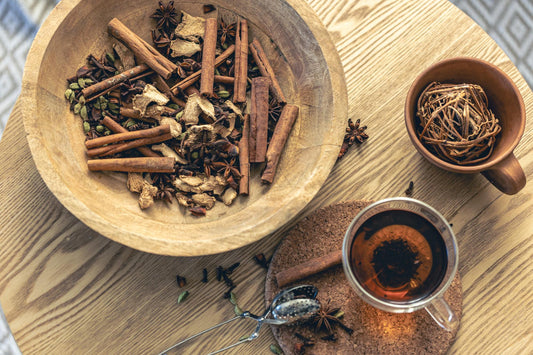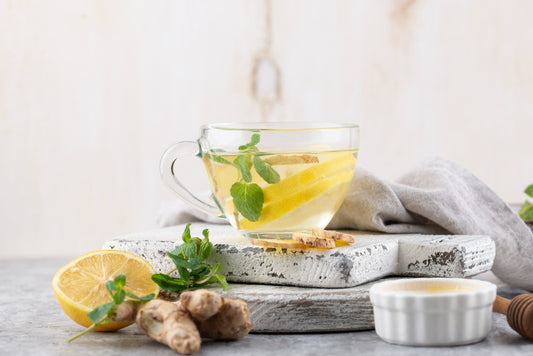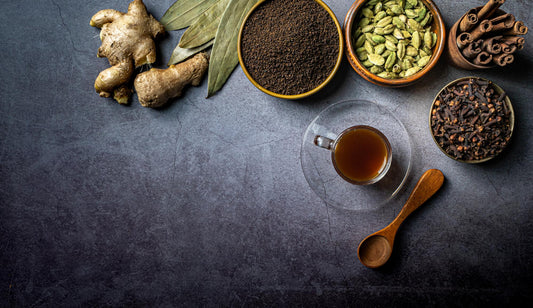Herbal Tea
Herbal tea, often referred to as tisane, is a beverage made from infusing various herbs, flowers, fruits, and spices in hot water.
Unlike traditional teas such as black, green, or white tea, which come from the Camellia sinensis plant, herbal tea is derived from a wide range of plants and botanicals.
The practice of steeping these natural ingredients in water dates back centuries, with roots in ancient civilizations like China, Egypt, and Greece.
Brief Explanation of Herbal Tea and Its Origins
Herbal tea is created by steeping plant materials in hot water, allowing their flavors, aromas, and beneficial compounds to infuse into the liquid.
These plant materials can include leaves, flowers, roots, seeds, and even bark.
The resulting beverage is often enjoyed for its unique taste and potential health benefits.
Unlike traditional teas that contain caffeine, herbal teas are naturally caffeine-free, making them a popular choice for individuals seeking alternatives to caffeinated beverages.
The origins of herbal tea can be traced back to ancient cultures that recognized the medicinal properties of plants.
In traditional Chinese medicine and Ayurveda, for example, various herbs and botanicals were used to treat ailments and promote overall well-being.
Indigenous cultures around the world also developed their own herbal remedies, using locally available plants to address health issues.
Growing Popularity as a Natural Health Remedy
In recent years, herbal tea has experienced a resurgence in popularity due to the increasing interest in natural remedies and holistic wellness.
Many people are turning to herbal teas as a way to support their health and well-being without relying solely on pharmaceutical solutions.
The appeal of herbal tea lies in its potential to provide a range of health benefits, from soothing an upset stomach to promoting relaxation and sleep.
As individuals become more health-conscious and seek alternatives to sugary beverages, herbal tea offers a flavorful and low-calorie option.
The diverse range of flavors and potential health benefits make herbal teas an appealing choice for those looking to incorporate more natural and functional beverages into their lifestyle.
Types of Herbal Tea and Their Health Benefits
Herbal teas encompass a wide range of flavors and therapeutic properties, making them a versatile choice for both enjoyment and health support.
Let's explore some popular herbal teas and the specific health benefits they offer:
1. Peppermint Tea
I. Digestive Aid and Soothing Effects
Peppermint tea is renowned for its ability to soothe digestive discomfort. The menthol in peppermint helps relax the muscles of the gastrointestinal tract, easing bloating, gas, and indigestion.
II. Relief from Headaches and Migraines
The menthol in peppermint also has a mild analgesic effect, which may provide relief from headaches and migraines when consumed as a tea.
2. Chamomile Tea
I. Calming and Stress-Reducing Properties
Chamomile tea is celebrated for its calming effects. It contains compounds like apigenin that bind to receptors in the brain, promoting relaxation and reducing stress and anxiety.
II. Promotes Sleep and Relaxation
Chamomile tea's sedative qualities make it a popular bedtime beverage, helping improve sleep quality and aiding in insomnia relief.
3. Ginger Tea
I. Anti-Inflammatory and Immune-Boosting Effects
Ginger tea contains gingerol, a potent anti-inflammatory compound that may help alleviate symptoms of inflammation-related conditions. Additionally, its immune-boosting properties can contribute to overall well-being.
II. Eases Nausea and Aids Digestion
Ginger has a long history of use as a remedy for nausea and digestive discomfort. Drinking ginger tea can help ease queasiness and support healthy digestion.
4. Echinacea Tea
I. Strengthens the Immune System
Echinacea tea is often consumed to support the immune system's defenses against infections. It contains compounds that may enhance immune function, helping the body fight off illnesses.
II. Potential in Reducing the Severity of Colds
Some research suggests that echinacea tea could reduce the duration and severity of cold symptoms, making it a popular choice during the cold season.
5. Lavender Tea
I. Anxiety and Stress Relief
Lavender tea's pleasant aroma and bioactive compounds can have a calming effect on the nervous system, potentially reducing symptoms of anxiety and stress.
II. Supports Healthy Skin and Digestion
Lavender tea's antioxidants may contribute to skin health by combating free radicals. It also possesses mild digestive benefits, aiding in digestive comfort.
6. Rooibos Tea
I. Packed with Antioxidants
Rooibos tea is rich in antioxidants like aspalathin and quercetin, which help neutralize harmful free radicals in the body, supporting overall health.
II. May Support Heart Health and Digestion
The antioxidants in rooibos tea may contribute to improved heart health, while its flavonoids could aid digestion and promote gut health.
Nutritional Components of Herbal Tea
Herbal teas are not only flavorful but also offer a range of nutritional components that contribute to their potential health benefits.
Let's delve into the key nutritional aspects of herbal teas
I. Polyphenols and Antioxidants
Many herbal teas are rich in polyphenols, a class of compounds known for their antioxidant properties.
Antioxidants help neutralize harmful free radicals in the body, which can contribute to aging and various chronic diseases.
The presence of polyphenols in herbal teas supports overall health by promoting cellular well-being and reducing oxidative stress.
II. Vitamins and Minerals Found in Different Herbal Teas
Different herbal teas contain varying amounts of vitamins and minerals that can contribute to a balanced diet. For instance, hibiscus tea is a good source of vitamin C, while nettle tea provides essential nutrients like iron and calcium. Including a variety of herbal teas in your routine can complement your nutrient intake and support overall wellness.
How to Prepare Herbal Tea
I. Proper Brewing Techniques
Brewing herbal tea correctly ensures that you extract the maximum flavor and beneficial compounds from the plant materials.
Here's a general guideline for preparing herbal tea:
- Boil water and let it cool slightly before pouring it over the herbal blend.
- Use about 1 to 2 teaspoons of dried herbs or 1 tea bag per 8-ounce cup.
- Steep the tea for the recommended time, usually 5 to 10 minutes, but this can vary depending on the type of herbal tea.
- Cover the cup while steeping to trap essential oils and flavors.
- Strain or remove the tea bag and enjoy.
II. Dosage and Frequency Considerations
While herbal teas are generally considered safe, it's important to be mindful of dosage and frequency, especially if you're using them for specific health purposes.
Read the instructions on the tea packaging for recommended amounts.
Start with moderation. Gradually increase consumption to assess how your body responds.
If you're using herbal tea for medicinal purposes, consult a healthcare professional for appropriate dosing and any potential interactions with medications.
Safety and Precautions
While herbal teas offer numerous health benefits, it's essential to be aware of potential risks and exercise caution, especially if you have underlying health conditions or are taking medications.
Here are some safety considerations when consuming herbal teas:
I. Possible Interactions with Medications
Certain herbal teas contain compounds that might interact with prescription or over-the-counter medications. For example, chamomile tea can interact with blood thinners, and St. John's wort tea might interfere with antidepressant medications. If you're on medication, consult your healthcare provider before incorporating herbal teas into your routine to avoid any adverse interactions.
II. Allergic Reactions and Sensitivities
Just like any other natural product, herbal teas can trigger allergies or sensitivities in some individuals. Be cautious if you have known allergies to plants within the same family as the herbs in the tea blend. It's a good practice to start with a small amount to test for any adverse reactions.
III. Consulting with a Healthcare Professional
Before using herbal teas for medicinal purposes, it's advisable to consult a healthcare professional, especially if you have pre-existing medical conditions, are pregnant or nursing, or are taking medications. A healthcare provider can provide personalized guidance and ensure that herbal teas align with your health needs.
Incorporating Herbal Tea into a Healthy Lifestyle
Incorporating herbal teas into your daily routine can contribute to a holistic approach to wellness and enhance your overall lifestyle:
I. Complementing a Balanced Diet
Herbal teas can provide additional nutrients, antioxidants, and bioactive compounds that complement your regular diet. For instance, nettle tea can be a source of iron and calcium, adding to your nutritional intake.
II. Substituting for High-Calorie or Sugary Beverages
Swapping sugary or calorie-laden beverages with herbal teas can help you cut down on excess sugar and calories. Herbal teas offer flavorful options with little to no added sugars.
III. Creating a Calming Ritual for Overall Wellness
Herbal teas, such as chamomile and lavender, have calming properties that make them ideal for relaxation and stress reduction. Establishing a calming tea-drinking ritual, especially before bedtime, can promote better sleep and overall well-being.
Research and Studies on Herbal Tea Benefits
Herbal teas have captured the attention of researchers and scientists due to their potential health-enhancing properties.
Here's an overview of the research landscape and ongoing investigations:
I. Summarizing Key Scientific Findings
Scientific studies have supported several health benefits associated with herbal teas.
For example, research has shown that chamomile tea's anti-inflammatory and calming effects can help reduce symptoms of anxiety and improve sleep quality.
Peppermint tea has been found to alleviate digestive discomfort, and ginger tea's anti-inflammatory properties are being investigated for their potential role in managing chronic conditions.
II. Highlighting Ongoing Research Areas
The exploration of herbal tea benefits is ongoing. Researchers are delving deeper into the mechanisms through which compounds in herbal teas exert their effects.
Studies are investigating the role of herbal teas in managing conditions such as diabetes, cardiovascular health, and cognitive function.
Ongoing research aims to provide a more comprehensive understanding of herbal teas' potential impacts on human health.
Common Myths and Misconceptions
Amid the growing popularity of herbal teas, it's important to address misconceptions and separate fact from fiction:
I. Distinguishing Between Evidence-Based Claims and Exaggerations
While herbal teas do offer various health benefits, it's crucial to differentiate between scientifically substantiated claims and exaggerated assertions.
Not every herbal tea is a cure-all, and individual responses can vary. Consulting reputable sources and scientific research can help you make informed decisions.
II. Addressing Misconceptions About Herbal Tea as a Miracle Cure
Herbal teas are not magical potions that can instantly cure ailments. They can be valuable additions to a holistic health regimen, but they should not replace medical treatments for serious conditions.
Herbal teas should be seen as supportive tools rather than replacements for conventional medical care.
Conclusion
In conclusion, the world of herbal teas offers a spectrum of flavors, aromas, and potential health benefits.
As we've explored throughout this blog, herbal teas can play a positive role in supporting various aspects of well-being.
They provide a natural and soothing way to relax, improve digestion, and even contribute to immune health.
By being aware of safety considerations, understanding ongoing research, and approaching herbal tea with a balanced perspective, you can integrate them into your daily routine for improved wellness.
Remember that enjoying herbal teas mindfully, while appreciating their diverse flavors and potential benefits, can contribute to a healthier and more holistic lifestyle.



